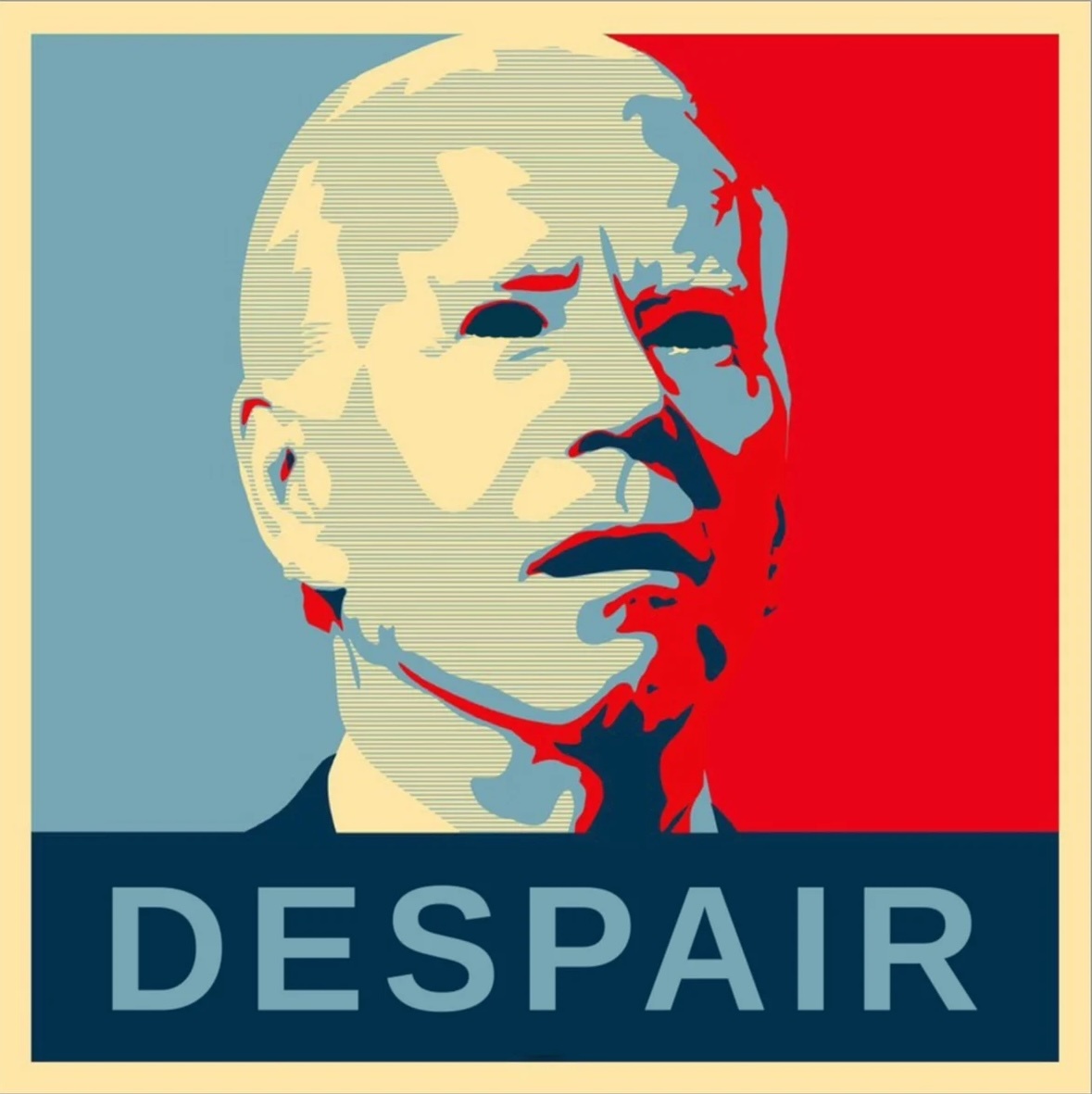emizeko
The subject takes pride in not having any relationship with the entire historic concrete movement of the working class socialist and liberation revolutions. They take pride in not having any theoretical or political connection to the revolutions in China, Russia, Korea, Vietnam, Algeria, Mozambique and Angola. They are, instead, proud of the supposed purity that their theory is not contaminated by the hardship of exercising power, by the contradictions of historical processes. Being pure is what provokes this narcissistic orgasm. This purity is what makes them feel superior.
from Western Marxism, the Fetish for Defeat, and Christian Culture by Jones Manoel
Two economists are walking in the park. The first economist sees a pile of dog shit and says to the other, "I'll pay you $50 to eat that dog shit." So he does and gets paid $50. Later on, the second economist sees a pile of dog shit and says to the first, "I'll pay you $50 to eat that pile of dog shit." So he does and gets paid $50.
The first economist says, "I can't help but feel we just ate dog shit for nothing." "Nonsense," says the second economist, "We just contributed $100 to the economy."
The fed: god inflation is so bad ugh we need to reduce the amount of money in circulation
The banks: 👉👈🥺 I need $300 billion and sloppy toppy literally right now
The fed: omg yes right away wow queen ur basis points are so huge
-
Adolf Heusinger, chief of the Operationsabteilung (third-in-command of the Wehrmacht) from 1940-1944 and Hitler’s acting Chief of Staff 1944, Chairman of the NATO Military Committee 1961-1964
-
Hans Speidel, chief of staff to Erwin Rommel, Supreme Commander of NATO’s ground forces in Central Europe 1957-1963
-
Johannes Steinhoff, Luftwaffe fighter pilot during WWII and recipient of the Knights Cross of the Iron Cross (the Nazi military’s highest award), Chairman of the NATO Military Committee 1971–1974
-
Johann von Kielmansegg, General Staff officer to the High Command of the Wehrmacht 1942-1944, NATO Commander in Chief of Allied Forces Central Europe 1967-1968
-
Ernst Ferber, Major in the Wehrmacht and group leader of the organizational department of the Supreme Command of the Army (Wehrmacht) 1943-1945 and recipient of the Iron Cross 1st Class, NATO Commander in Chief of Allied Forces Central Europe 1973-1975
-
Karl Schnell, battery chief in the Western campaign in 1940/later First General Staff Officer of the LXXVI Panzer Corps in 1944 and recipient of the Iron Cross 2nd Class, NATO Commander in Chief of Allied Forces Central Europe 1975-1977
-
Franz Joseph Schulze, Lieutenant in the reserve and Chief of the 3rd Battery of the Flak Storm Regiment 241 and recipient of the Knight’s Cross of the Iron Cross in 1944, NATO Commander in Chief of Allied Forces Central Europe 1977-1979
-
Ferdinand von Senger und Etterlin, Lieutenant of 24th Panzer Division in the German 6th Army, participant in the Battle of Stalingrad, adjutant to Army High Command, and recipient of the German Cross in gold, NATO Commander in Chief of Allied Forces Central Europe 1979-1983
The dossier/Snopes approach doesn’t work because it attempts to apply facts and reason to people who are not interested in either facts or reason. That’s not a nice thing to say, or even to think, about anyone else, which is why I was reluctant and slow to reach that conclusion. But that conclusion was inevitable.
In trying to combat the P&G slander with nothing more than irrefutable facts proving it false, I was operating under a set of false assumptions. Among these:
- I assumed that the people who claimed to believe that Procter & Gamble supported the Church of Satan really did believe such a thing.
- I assumed that they were passing on this rumor in good faith— that they were misinforming others only because they had, themselves, been misinformed.
- I assumed that they would respect, or care about, or at least be willing to consider, the actual facts of the matter.
- Because the people spreading this rumor claimed to be horrified/angry about its allegations, I assumed that they would be happy/relieved to learn that these allegations were, indisputably, not true.
All of those assumptions proved to be false. All of them. This was at first bewildering, then disappointing, and then, the more I thought about it, appalling— so appalling that I was reluctant to accept that it could really be the case.
But it is the case. Let’s go through that list again. The following are all true of the people spreading the Procter & Gamble rumor:
- They didn’t really believe it themselves.
- They were passing it along with the intent of misinforming others. Deliberately.
- They did not respect, or care about, the actual facts of the matter, except to the extent that they viewed such facts with hostility.
- Being told that the Bad Thing they were purportedly upset about wasn’t real only made them more upset. Proof that the 23rd largest corporation in America was not in league with the Devil made them defensive and very, very angry.
As Rosanov says, men are crushed under the wardrobe. Without lifting up the wardrobe it is impossible to deliver whole peoples from their endless and unbearable suffering. It is terrible that even one man should be crushed under such a weight: to want to breathe, and not to be able to. The wardrobe rests on everybody, and everyone gets his inalienable share of suffering. And everybody tries to lift up the wardrobe, but not with the same conviction, not with the same energy. A curious groaning civilization.
Thinkers ask themselves: “What? Men under the wardrobe? However did they get there?” All the same, they got there. And if someone comes along and proves in the name of objectivity that the burden can never be removed, each of his words adds to the weight of the wardrobe, that object which he means to describe with the universality of his ‘objective consciousness’. And the whole Christian spirit is there, fondling suffering like a good dog and handing out photographs of crushed but smiling men. “The rationality of the wardrobe is always the best”, proclaim the thousands of books published every day to be stacked in the wardrobe. And all the while everyone wants to breathe and no-one can breathe, and many say “We will breathe later”, and most do not die, because they are already dead.
—Raoul Vaneigem, The Revolution of Everyday Life
The life of a single human being is worth millions of times more than all of the properties of the richest man on earth.
—Che Guevara
would you feel comfortable face-to-face explaining to a Palestinian child why you voted for his extermination?
[...] the frustrated and humiliated intellectual, the rich and scared speculator, the spoiled son, the labor tyrant, the fellow who has achieved success by smelling out the wind of success—they would all go Nazi in a crisis.
from Who Goes Nazi? by Dorothy Thompson
Here, then, is the problem with the magazine: readers are consistently given the impression, regardless of whether it is true, that unrestricted free market capitalism is a Thoroughly Good Thing, and that sensible and pragmatic British intellectuals have vouched for this position. The nuances are erased, reality is fudged, and The Economist helps its American readers pretend to have read books by telling them things that the books don’t actually say.
How The Economist Thinks | Current Affairs





